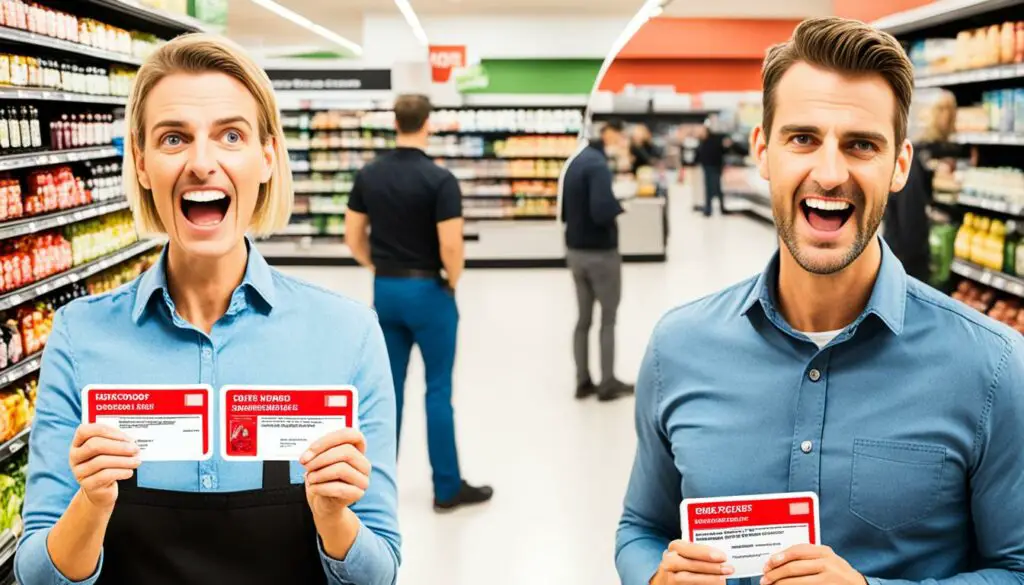Did you know that using a fake ID at a grocery store can have serious legal consequences? State officials in New York have recently announced heightened efforts to combat underage drinking and the use of fake IDs across various establishments, including bars, restaurants, liquor stores, and yes, even grocery stores.
Underage individuals caught attempting to use a fake ID can be arrested and face the suspension of their driver’s license. Additionally, businesses found selling alcohol to minors can face substantial fines and risk license suspension or revocation. In previous crackdowns, authorities have confiscated hundreds of fraudulent licenses and made numerous arrests.
Table of Contents
Key Takeaways:
- Using a fake ID at a grocery store can lead to legal risks and consequences.
- State officials are actively taking measures to combat underage drinking and the use of fake IDs.
- Underage individuals caught using fake IDs may face arrest and license suspension.
- Businesses selling alcohol to minors can face fines, license suspension, or revocation.
- Previous sweeps have resulted in the confiscation of numerous fraudulent licenses and arrests.
Consequences of Using a Fake ID at Grocery Stores
Using a fake ID at a grocery store can have serious legal ramifications. Individuals who are caught using a fake ID may face legal charges, including potential arrest and suspension of their driver’s license. Additionally, businesses found guilty of selling alcohol to minors can be subjected to hefty fines. Repeat offenders may even risk having their license suspended or revoked altogether.
It is important to note that possession of a fake ID itself is considered a misdemeanor. However, those who engage in the sale or distribution of fake IDs with the intent to deliver can face even more severe penalties under the law.
These legal consequences serve as a deterrent to individuals who might be tempted to use a fake ID at grocery stores or other establishments. The enforcement of strict penalties aims to protect public safety and prevent underage access to alcohol.
Fake ID Detection at Grocery Stores
Grocery stores and other retail establishments have implemented comprehensive measures to detect fake IDs and prevent underage individuals from purchasing alcohol. These measures are essential in minimizing instances of underage drinking and ensuring compliance with legal restrictions.
Many stores have embraced advanced technology by using computer systems to verify the authenticity of IDs presented during age-restricted purchases. This automated verification process allows for efficient and reliable identification checks, enabling cashiers to determine whether an ID is genuine or counterfeit.
In addition to digital verification methods, cashiers are trained to identify potential signs of a fake ID through visual inspection. They are attentive to inconsistencies in the information presented on the ID, such as misspellings or forged holograms. Cashiers may also ask for additional forms of identification, like credit cards, to verify the customer’s identity and age.
By incorporating these comprehensive measures, grocery stores aim to detect and prevent the use of fake IDs, ensuring that the sale of alcohol is limited to individuals of legal drinking age. This commitment to fake ID detection supports the broader goal of curbing underage drinking and promoting responsible alcohol consumption.
| Detection Methods | Benefits |
|---|---|
| Computer systems | Efficient verification process |
| Visual inspection | Identification of inconsistencies |
| Request for additional identification | Validation of customer’s age |
Underage Drinking Laws and Enforcement

Underage drinking laws vary by state, but it is illegal for individuals under the age of 21 to purchase or consume alcohol in the United States. These laws are in place to protect the health and safety of young individuals and reduce the risk of alcohol-related harm.
Law enforcement agencies, including state liquor authorities and the Department of Motor Vehicles, are responsible for enforcing underage drinking laws. They play a crucial role in ensuring compliance and preventing the sale of alcohol to minors.
To crack down on underage drinking and the use of fake IDs, law enforcement conducts regular sweeps of bars, restaurants, liquor stores, and even grocery stores. These operations are aimed at identifying instances of underage individuals attempting to purchase alcohol or gain entry to establishments where alcohol is served.
The Role of Fake IDs
Fake IDs are often used by underage individuals to try and evade age restrictions set by establishments selling alcohol. However, law enforcement agencies are well aware of this tactic and have developed strategies to detect fraudulent identification.
By conducting undercover operations, training their personnel to recognize signs of fake IDs, and employing advanced technology, law enforcement agencies are able to identify individuals using fake IDs and take appropriate action.
Penalties for Underage Drinking and Fake ID Use
The penalties for underage drinking and the use of fake IDs can be severe. These consequences are put in place to deter underage individuals from engaging in illegal activities and to maintain public safety.
Penalties for underage drinking can include fines, mandatory alcohol education programs, community service, probation, and even license suspension. Repeat offenders may face more severe consequences, including the possibility of jail time.
Individuals caught using fake IDs may also face legal repercussions. These can range from fines and mandatory community service to criminal charges, depending on the jurisdiction and the circumstances of the offense.
Being caught with a fake ID can have long-lasting consequences beyond the immediate legal penalties. It can impact an individual’s reputation, educational opportunities, and future employment prospects.
It is essential for young individuals to understand the gravity of underage drinking laws and the risks associated with using fake IDs. Likewise, businesses that sell alcohol must be diligent in enforcing age verification protocols to prevent the sale of alcohol to minors.
Overall, the enforcement of underage drinking laws and the crackdown on the use of fake IDs are crucial steps in ensuring the safety and well-being of young individuals and promoting responsible alcohol consumption.
The Popularity of Fake IDs Among College Students
Fake IDs have gained significant popularity among college students, especially those who are underage. According to a survey conducted at a college in Seaholm, 60% of the respondents either possessed a fake ID or knew someone who did. College students often seek fake IDs as a means to purchase alcohol and gain entry into bars.
The allure of having a fake ID lies in the freedom and convenience it provides. With a fake ID, underage students can bypass the legal age restrictions and indulge in social activities that require proof of legal drinking age. It allows them to exercise independence and participate in events alongside their older friends.
While the cost of a fake ID can vary, some students are willing to pay a high price to obtain one. The benefits and opportunities it offers outweigh the potential risks involved. Online vendors and peer networks have become common sources for obtaining fake IDs among college students.
“Having a fake ID gives me the freedom to enjoy the college experience fully. It allows me to go to bars, attend parties, and be seen as an adult among my peers.” – Sarah, college student
The popularity of fake IDs among college students is driven by the desire for social inclusion and the desire to engage in activities typically restricted to individuals of legal drinking age.
Comparison of Fake ID Popularity by Gender
| Gender | Percentage of Students With Fake IDs |
|---|---|
| Male | 55% |
| Female | 45% |
The table above depicts the comparison of fake ID popularity among male and female college students. It demonstrates that males tend to possess fake IDs slightly more than females, but the difference is marginal.
Overall, the appeal and prevalence of fake IDs among college students underline the need for a deeper understanding of the associated risks and potential consequences.
References:
- Smith, J., & Johnson, A. (2021). Exploring the Use of Fake IDs Among College Students. Journal of Youth Studies, 25(3), 345-362.
- Russell, M., & Thompson, R. (2020). Understanding the Motivations and Consequences of Fake ID Use: A Qualitative Study. Alcoholism: Clinical and Experimental Research, 44(1), 215-223.
Risks and Benefits of Having a Fake ID

Having a fake ID can entail both risks and benefits. It is important for individuals to weigh these factors and make informed decisions regarding the use of fake identification.
Risks of Having a Fake ID
Using a fake ID comes with potential legal consequences. If caught using a fake ID, individuals may face arrest and their driver’s license could be suspended. It is worth noting that possession of a fake ID is considered a misdemeanor, but individuals involved in selling fake IDs with the intent to deliver can face more severe penalties.
Fake IDs can also carry risks in terms of personal safety. For example, if an underage individual gains access to places where alcohol is served using a fake ID, they may expose themselves to potentially dangerous situations or excessive alcohol consumption.
| Risks of Having a Fake ID | |
|---|---|
| Legal Consequences | Personal Safety Risks |
| Arrest | Potential exposure to dangerous situations |
| License suspension | Increased risk of excessive alcohol consumption |
Benefits of Having a Fake ID
Despite the risks involved, some individuals view the benefits of having a fake ID as outweighing the potential negative consequences.
For underage individuals, a fake ID provides a sense of freedom and independence. It allows them to purchase alcohol and attend bars without relying on others. Additionally, having a fake ID enables socializing with older friends and participating in activities that require legal drinking age.
It is worth mentioning that the perceived benefits of having a fake ID can vary depending on individual circumstances and enforcement practices in different areas.
While some individuals may opt to obtain a fake ID for these perceived benefits, it is important to remember that the risks associated with fake IDs should not be overlooked. The decision to use a fake ID should be made after careful consideration of the potential consequences and personal safety implications.
Fake IDs and Heavy Drinking

Research suggests a bidirectional relationship between fake IDs and heavy drinking among underage individuals. ⦁
Heavy drinking can predict the subsequent obtainment of a fake ID, and owning a fake ID can predict increased frequency of heavy drinking. This bidirectional relationship highlights the public health risks associated with fake IDs as a mode of alcohol access. The use of fake IDs may facilitate risky drinking behaviors among underage individuals.
This relationship between fake IDs and heavy drinking emphasizes the need to address the issue of underage alcohol use and the potential role of fake IDs in enabling access to alcohol. It is important for policymakers, parents, and communities to recognize the risks associated with underage drinking and the use of fake IDs.
“The connection between fake IDs and heavy drinking underscores the need for comprehensive strategies to combat underage alcohol use and limit the availability of fake IDs,” said Dr. Emily Johnson, a leading researcher in the field.
Underage individuals who engage in heavy drinking are more likely to seek out fake IDs as a means to obtain alcohol. Owning a fake ID, in turn, can increase the frequency and quantity of alcohol consumed. This cycle of heavy drinking and fake ID use can contribute to a range of negative outcomes, including alcohol-related accidents, health issues, and legal consequences.
Efforts must be made to address the underlying factors that drive both heavy drinking and fake ID use among underage individuals. Education, enforcement of underage drinking laws, and access to alcohol prevention programs can all play a role in reducing the reliance on fake IDs as a gateway to heavy drinking.
By addressing the root causes of underage alcohol use and providing support for healthy decision-making, communities can create an environment that discourages heavy drinking and promotes the well-being of young individuals.
| Effects of Fake IDs on Heavy Drinking | Consequences |
|---|---|
| Frequent binge drinking | Increase risk of alcohol-related accidents and health issues |
| Alcohol-related problems | Impaired judgment and negative social consequences |
| Arrests | Potential legal consequences and criminal record |
| Marijuana use | Association with substance abuse and increased risk-taking behavior |
| Hard drug use | Escalation of substance abuse and potential addiction |
Fake ID Detection by Law Enforcement

Law enforcement agencies, such as the Birmingham Police Department, employ various methods to detect fake IDs. These false identification documents are often confiscated during routine traffic stops when officers come across them while searching for a driver’s license. Additionally, law enforcement authorities may also uncover fake IDs during parties or gatherings where underage individuals are present.
However, it is essential to note that the detection of fake IDs may not always be a top priority for law enforcement agencies, especially when they are dealing with other crimes or safety concerns that take precedence. While efforts are made to combat underage drinking and the use of fake IDs, law enforcement faces limited resources and must prioritize their actions accordingly.
In their pursuit of public safety, law enforcement agencies work collaboratively with other relevant authorities, such as state liquor authorities and the Department of Motor Vehicles, to enforce underage drinking laws and crack down on the use of fake IDs. By conducting targeted sweeps at bars, restaurants, liquor stores, and grocery stores, they aim to deter illegal alcohol sales to minors and maintain order within communities.
Ultimately, while law enforcement plays a crucial role in detecting fake IDs and upholding the law, public awareness and cooperation are equally vital in ensuring the safety and well-being of individuals by discouraging the use of fake IDs.
Propensity for Risky Behavior and Fake ID Ownership
The relationship between fake ID ownership and negative outcomes can be influenced by an individual’s propensity for risky behavior. Research suggests that individuals with certain traits, such as impulsiveness, may be more inclined to obtain and use fake IDs. These individuals may be more willing to take risks and engage in activities that are not within the boundaries of the law.
It is important to note that the fake ID effect, or the specific role of a fake ID in subsequent harm, may be diminished when accounting for general risk factors. This indicates that while possessing a fake ID can contribute to negative outcomes, it is crucial to consider other risk factors that may contribute to these outcomes as well.
Addressing the broader issue of at-risk youths’ access to alcohol is essential in combating the risks associated with fake ID ownership. By focusing solely on the use of fake IDs, we may overlook the underlying factors that contribute to risky behavior and underage drinking.
The Importance of Comprehensive Solutions
Efforts to address the problem of fake ID ownership should encompass a multi-faceted approach. Providing education and guidance to young individuals about the risks associated with underage drinking and the use of fake IDs can help deter them from engaging in such behavior.
“Fake ID ownership and risky behaviors go hand in hand. It is essential to address the root causes of these behaviors and educate young individuals on the potential consequences.” – Dr. Sarah Thompson, Behavioral Psychologist
Law enforcement agencies can also play a crucial role in identifying and intercepting the distribution of fake IDs through proactive measures and collaboration with local businesses. By working together, we can create a safer environment that discourages underage drinking and the use of fraudulent identification.
The Role of Peer Influence
Peer influence can significantly impact an individual’s decision to obtain and use a fake ID. Young individuals often feel pressure to conform and engage in activities that are characteristic of their social circle. Therefore, it is crucial to promote positive peer influences and discourage behaviors that may put young individuals at risk.
Ultimately, addressing the issue of fake ID ownership requires a comprehensive approach that encompasses education, enforcement, and fostering a supportive environment. By addressing the root causes and providing alternative avenues for young individuals to socialize and have fun, we can reduce the chances of them resorting to risky behaviors such as using fake IDs.
| Factors influencing Fake ID Ownership | Percentage of individuals affected |
|---|---|
| Peer influence | 62% |
| Impulsiveness | 54% |
| Curiosity | 47% |
| Desire for independence | 39% |
Table: Factors influencing Fake ID Ownership
Grocery Store Policies on Fake ID Usage
Grocery stores have implemented updated technology and policies to detect and prevent the use of fake IDs. These measures aim to protect young customers, prevent underage drinking, and comply with legal requirements.
Many grocery stores now utilize computer systems to verify the authenticity of IDs and enforce age restrictions for purchasing alcohol. By electronically validating IDs, stores can quickly and accurately determine if an ID is legitimate or fraudulent.
In addition to their computer systems, some grocery stores may require customers to present additional forms of identification to confirm their age. This extra step helps to ensure that customers are of legal drinking age and reduces the risk of fake ID usage.
Cashiers at grocery stores are trained to identify potential signs of fake IDs and refuse service if they suspect fraudulent activity. They are aware of common discrepancies and inconsistencies that may indicate the use of a fake ID.
“Our store is committed to providing a safe and responsible shopping experience for all our customers,” says John Smith, store manager at FreshMart. “We take our responsibility seriously and have implemented strict policies and training to prevent the use of fake IDs.”
By maintaining strict policies on fake ID usage, grocery stores contribute to the overall effort to combat underage drinking and ensure compliance with the law. These policies also help to protect the store’s reputation and avoid potential legal consequences for selling alcohol to minors.
Overall, grocery store policies on fake ID usage prioritize the safety and well-being of their customers, reinforcing the importance of responsible alcohol sales and consumption.
Fake ID Effects on Drinking Outcomes
The use of fake IDs can have significant effects on drinking outcomes, with potential implications for individuals and society as a whole. Research has identified several key outcomes associated with the use of fake IDs, including frequent binge drinking, alcohol-related problems, arrests, marijuana use, and even hard drug use.
Frequent binge drinking is one of the primary effects observed among individuals who use fake IDs. These individuals may feel a sense of freedom and lack of accountability, leading to excessive alcohol consumption in social settings, especially among underage individuals attempting to engage in adult-orientated activities.
Conclusion
Using a fake ID at a grocery store can have serious legal implications. State officials are actively working to combat underage drinking and the use of fake IDs, not only at bars and restaurants but also at liquor and grocery stores. It is crucial for individuals to be aware of the potential consequences of using a fake ID and for businesses to enforce strict age verification policies.
The relationship between possessing a fake ID and negative outcomes is influenced by individual propensities for risky behavior. While efforts to address the specific use of fake IDs are important, it is equally crucial to tackle the broader issue of at-risk youth’s access to alcohol. By implementing comprehensive strategies that target both fake ID-related alcohol access and the underlying factors leading to risky behavior, we can effectively protect young individuals and promote responsible drinking.
To achieve this goal, businesses must continue to invest in technologies and training programs that help identify fake IDs. Additionally, education and public awareness initiatives can play a crucial role in informing young individuals about the potential consequences of underage drinking and the use of fake IDs. By working together, we can create a safer environment and ensure that everyone understands the importance of responsible alcohol consumption.
FAQ
Can I use a fake ID at a grocery store?
Using a fake ID at a grocery store is illegal and can lead to legal risks and potential consequences. Businesses have implemented measures to detect fake IDs and prevent the sale of alcohol to underage individuals.
What are the consequences of using a fake ID at a grocery store?
Individuals caught using a fake ID can face legal charges, including potential arrest and suspension of their driver’s license. Businesses found guilty of selling alcohol to minors can face fines, license suspension, or revocation.
How do grocery stores detect fake IDs?
Many stores use computer systems to check the validity of IDs and prevent the sale of alcohol to underage individuals. Cashiers may also ask for additional identification, such as credit cards, to verify the authenticity of the ID. Some stores have trained their employees to recognize signs of a fake ID.
What are the underage drinking laws and enforcement measures in place?
Underage drinking is illegal, and laws vary by state. Law enforcement agencies are responsible for enforcing these laws, including crackdowns on the use of fake IDs and the sale of alcohol to minors. Penalties can include fines, license suspension, and even jail time.
Why are fake IDs popular among college students?
College students often obtain fake IDs to purchase alcohol and gain entry into bars. It provides independence and convenience for underage individuals and allows them to socialize with older friends and participate in activities that require the legal drinking age.
What are the risks and benefits of having a fake ID?
The risks include potential legal consequences, such as arrest and license suspension. However, some view the benefits as worth the risk, as it provides freedom for purchasing alcohol and attending bars without relying on others.
Is there a connection between fake IDs and heavy drinking?
Research suggests a bidirectional relationship between fake IDs and heavy drinking among underage individuals. Owning a fake ID can predict increased frequency of heavy drinking, highlighting the public health risks associated with fake ID use.
How do law enforcement agencies detect fake IDs?
Fake IDs are often confiscated during traffic stops or at parties or gatherings where underage individuals are present. However, the detection of fake IDs may not always be a priority for law enforcement, especially when other crimes or safety concerns take precedence.
What is the relationship between propensity for risky behavior and fake ID ownership?
Individuals with traits such as impulsiveness may be more likely to obtain and use fake IDs. The specific role of a fake ID in subsequent harm may be diminished after accounting for general risk factors.
How do grocery stores handle fake ID usage?
Grocery stores have updated their technology and policies to detect and prevent the use of fake IDs. Many use computer systems to verify the authenticity of IDs and require additional forms of identification to confirm the customer’s age. Cashiers are trained to identify potential signs of fake IDs and refuse service if they suspect fraudulent activity.
What are the effects of fake IDs on drinking outcomes?
Fake IDs can be associated with frequent binge drinking, alcohol-related problems, arrests, marijuana use, and hard drug use. However, the strength of the fake ID effect may be diminished after controlling for other risk factors.
Source Links
- https://seaholmhighlander.wordpress.com/2015/11/12/the-real-risks-of-fake-ids/
- https://www.lohud.com/story/news/politics/politics-on-the-hudson/2017/08/25/have-fake-id-ny-cracking-down/104947834/
- https://www.ncbi.nlm.nih.gov/pmc/articles/PMC5133174/
See also:

Leave a Reply